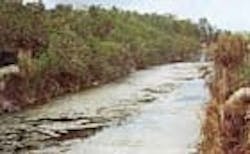Judge: EPA, Florida Must Set Limits on Fertilizer, Animal Waste Pollution in State Waters
A federal judge in Tallahassee, Fla., approved a consent decree which requires the U.S. Environmental Protection Agency (EPA) to set legal limits for nutrient poisoning that triggers harmful algae blooms in Florida waters.
The change in federal policy comes 13 months after five environmental groups filed a lawsuit to compel the federal government to set strict limits on nutrient poisoning in public waters.
Environmental groups claimed nutrients like phosphorous and nitrogen poison Florida's waters every time it rains; running off agricultural operations, fertilized landscapes and septic systems. The runoff triggers algae outbreaks that foul Florida's beaches, lakes, rivers and springs more each year.
Currently, Florida and most other states have only vague limits regulating nutrient pollution, according to the environmental groups.
"The Clean Water Act is strong medicine," said David Guest, attorney for Earthjustice. "The EPA can now get on with the work of setting standards that will clean up our waters. We're hoping to see safe drinking water, clear springs, lakes and rivers again."
A 2008 Department of Environmental Protection report concluded that half of the state's rivers and more than half of its lakes had poor water quality. The problem is compounded when nutrient-poisoned waters are used as drinking water sources, according to Earthjustice. Disinfectants like chlorine and chloramine can react with the dissolved organic compounds, contaminating drinking water with harmful chemical byproducts.
"The long-lasting and worsening pollution of our lakes, rivers, beaches and springs hurts Florida's economy and needs to end," said Florida Wildlife Federation President Manley Fuller. "This day has been a long time coming."
"Asking for clean water is not a stretch," said St. Johns Riverkeeper Neil Armingeon. "There are algae blooms even today in the St. Johns River. Moving forward quickly is imperative."
Earthjustice, a public interest law firm, filed the suit in the Northern District of Florida on behalf of the Florida Wildlife Federation, the Conservancy of Southwest Florida, the Environmental Confederation of Southwest Florida, St. John's Riverkeeper and the Sierra Club in July 2008. The suit challenged what the groups called a decade-long delay by the state and federal governments in setting limits for nutrient pollution.
Source: Earthjustice
